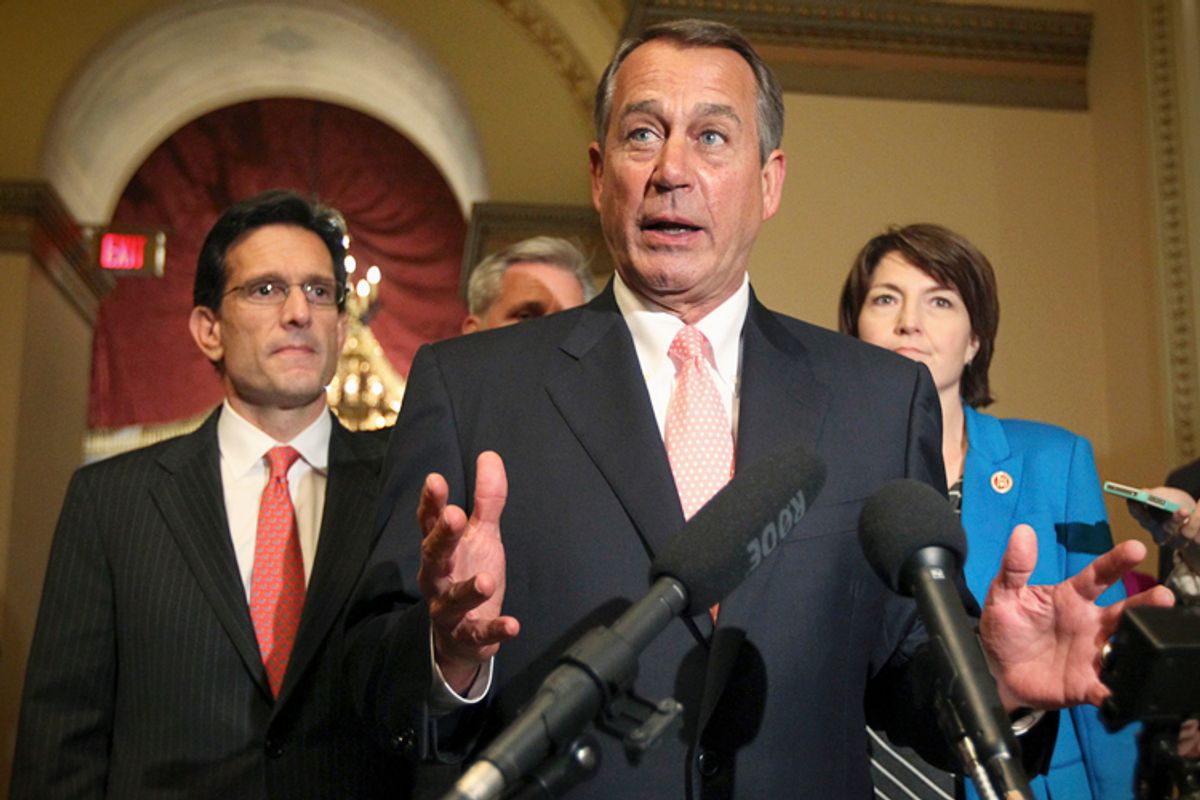If a government shutdown genuinely shut the entire government down, you might be able to trace a few silver linings from an otherwise bad situation. Military conflicts might end (or at least be temporarily suspended), the destructive drug war might grind to a halt, mass surveillance might be put on hold and congressional legislators might be financially punished for their malicious behavior. But a government shutdown is mostly just a shutdown of good things -- stuff like Head Start and food assistance to low-income moms and kids. Indeed, because of the way shutdowns are structured, the only silver lining from a budget stalemate is that you might get to hear a few curse words and see some nudity on television.
Of course, there is an insidious method to the madness of government shutdowns. In general, the dividing line between what gets shut down and what doesn't is a similar dividing line between what America's political culture typically venerates as The State and what that culture lambasts as The Government. Consider what will not be shut down:
- The State's war machine is largely exempted from the shutdown. Sure, the Armed Forces' football season is in jeopardy. But our wars will press on unabated and many military paychecks -- including to private contractors -- will continue to be issued, even as other federal workers are furloughed.
- Many key parts of The State's surveillance apparatus are exempted from the shutdown. That's not to say the shutdown affects nothing at the NSA. The agency cannot, for instance, respond to the public's Freedom of Information Act requests (which is convenient for the NSA). And some of its employees are, in fact, furloughed. But a lot of the spying will still go on.
- Despite its failures and rampant waste, much of the Drug War is exempted from the shutdown. So are many of The State's other police-related activities.
- The government shutdown does not affect the Internal Revenue Service's ability to collect taxes. It only means you can't get your tax questions answered.
- The lawmakers who orchestrated the government shutdown are exempted from the government shutdown. Yes, they will still be getting handsomely remunerated, without having to worry that they might lose their paychecks like other federal employees.
So, in sum, major portions of The State -- aka the Military-Industrial Complex, the Police State, the revenue-generating apparatus of the IRS and professional politicians in Washington -- are somewhat exempted from the effects of the shutdown. Meanwhile, The Government -- aka the Safety Net, the Regulators and the Inspectors -- gets hit hard.
At a practical level, this institutionalized double standard creates incentives for government shutdowns -- at least on the political right. That's because while conservatives loathe The Government, they love The State.
Remember, Republicans in Congress have historically been stalwart supporters of ever-larger defense budgets, more expansive surveillance, a persistent drug war and basic tax collection services to finance those expensive initiatives. Quite naturally, they also like to get paid, even when everyone else isn't getting paid. Therefore, the laws that automatically exempt The State from government shutdowns effectively encourage Republican lawmakers to support said shutdowns. They get to close primarily the parts of the public sector they oppose -- while protecting the parts of the public sector that they (and their campaign contributors) champion.
There is, no doubt, a larger political calculation at work in this shutdown strategy. Basically, the GOP is betting that the American public makes a similar distinction between a despised Government and a beloved State. And sadly, that political calculation may not be so dumb. After all, for all the well-deserved policy criticism now being aimed at the GOP for forcing a shutdown, the party is deftly evincing a pernicious attitude in America at large. Suffused with value-laden judgments about different kinds of national service, this mindset makes many Americans quick to valorize public employees in the military/police/security parts of the public sector -- while simultaneously denigrating public employees in the other parts of the public sector.
You know these people because you've met them. They are the folks who angrily berate "lazy" government workers while slapping a "Support Our Troops" sticker on their bumper -- without recognizing that the troops are government workers. In other words, they are the people who pledge flag-waving fealty to The State and also profess passionate hatred of The Government.
This perceived distinction between The State and The Government was manufactured by many forces. Popular culture, for instance, has long popularized the idea of the Brave Military and the Worthless Bureaucracy. Likewise, the conservative movement has promoted the Heroic Soldier and the Lazy Civil Servant memes. Meanwhile, the ordinary citizen's most memorable interactions with the public sector help fuel the mythology.
Think about it: Few cheer when The Government works, because when The Government works properly it means stuff like decent roads and smoothly functioning social services -- that is, stuff that we simply expect. We remember, though, the relatively few times The Government doesn't work; we remember the line at the DMV, the delayed subway that made us late to work and the traffic created by ill-timed road construction. That can encourage many to hate The Government -- and because many (particularly non-minorities) have comparatively little interaction with the police and military, it is easy to still love The State.
That dissonance is exactly what the Republicans are now counting on. Their shutdown may be a risky political gamble. But after decades of scorched-earth politics that denigrates The Government and venerates The State, it is unfortunately a gamble that could at once harm the country and further aid the GOP.



Shares